After three tightly contested games that went to overtime, the Washington Capitals delivered back-to-back dud performances against the Boston Bruins in Game 4 and Game 5 of their first-round playoff series. These performances yielded ugly defeats and have seen the Capitals face first-round elimination for the third year in a row. The team showed no signs of having made any adjustments to counter the Bruins’ dominant stretches of play. With the series over, the Capitals will be forced back to the drawing board much sooner than they had hoped.
The Team That Couldn’t Get Past Round 2
Prior to winning the Stanley Cup in 2018, the Capitals had developed an unfortunate reputation as a team that couldn’t get beyond the second round of the playoffs. Alexander Ovechkin’s rookie season was back in 2005-06. The coach was Glen Hanlon and the team missed the playoffs for Ovechkin’s first two seasons. Midway through the 2007-08 season, Hanlon was fired and Bruce Boudreau took over. Under Boudreau, the team made the playoffs four times, never getting beyond the second round. Boudreau was let go midway through the 2011-12 season and Dale Hunter coached the team to a second-round playoff exit.
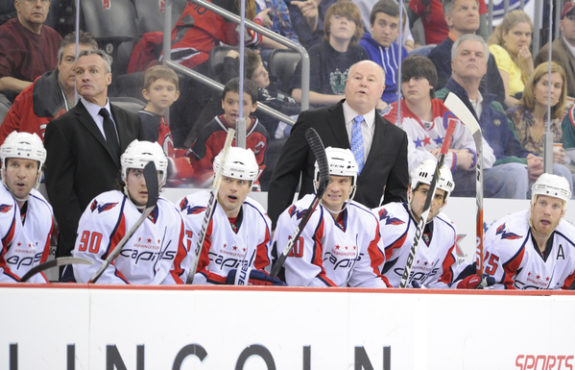
Adam Oates took over as coach after that for two seasons, which saw the team exit in the first round in 2012-13 and miss the playoffs entirely in 2013-14. That playoff miss cost Oates his job, and the team hired Barry Trotz. For three seasons under Trotz, the Capitals exited the playoffs in the second round and it seemed like this team, and it’s captain would never get beyond the second round.
Then, in 2017-18, a miracle happened. The Capitals made it beyond the second round and won their first Stanley Cup in franchise history. Instead of coming to contract terms with Trotz, the team allowed him to walk off into the sunset to Long Island. Former assistant, Todd Reirden, took over the team and coached them to two first-round playoff defeats. The second defeat came at the hands of the New York Islanders coached by Trotz. That series was embarrassing enough to cost Reirden his job.
RELATED: Capitals Relieve Reirden of Coaching Duties
To replace him, the team hired veteran coach Peter Laviolette. The hope was that now things were going to be different. Laviolette has brought three different teams to the Stanley Cup Final and has won the Cup once. Management, the fans and the players had every right to believe that he had the tools to get this team back to the mountaintop. Yet, here the Capitals are again, facing the reality of a first-round exit.
New Coach, Same Story
This is a veteran group of players that, in theory, shouldn’t require additional motivation to push for a championship. Two seasons of lackadaisical playoff efforts under Reirden cost him his job. At the time, it seemed pretty clear that he was being outcoached in the playoffs and just didn’t have what it took to motivate this team. With him gone, theoretically, things should be different. Since they aren’t different, what’s the excuse now, and who’s to blame this time? There’s no in-over-his-head, first-time coach to make an easy scapegoat anymore. If someone has to take the blame, there’s really only three places blame can be placed for this early exit: players, coaches, and management.
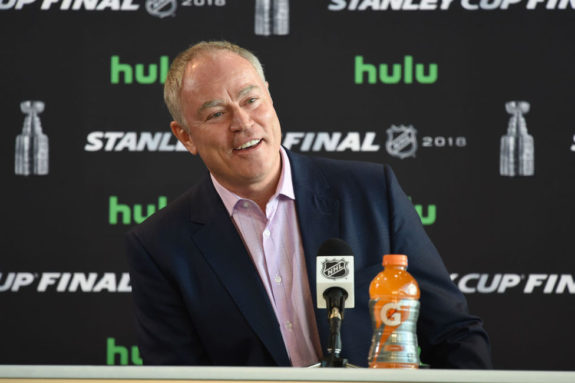
Management probably gets the least blame here. General manager Brian MacLellan has made moves to give this team the pieces to win and win now. When it was time to hire a new coach, he went out and hired one with a seemingly proven track record of success. Just in the last 12 months, the Capitals have retained Brenden Dillon, acquired Zdeno Chara, Justin Schultz, and Conor Sheary via free agency, and made a big trade for Anthony Mantha. All those moves paid big dividends for the team in the regular season, but they weren’t enough to move the needle in the playoffs.
When the moves that were made show clear positive results in the regular season but not in the playoffs, it’s really hard to hold management responsible. Sheary contributed 14 goals in 53 regular-season games, making him fourth on the team in goal scoring. Schultz’s 27 points in 46 games was second among team defensemen in points. Dillon and Chara both averaged over 18 minutes per game over the course of the season, delivering good defensive results. Mantha seemed to find immediate chemistry and gathered eight points in the 14 games he played as a Capital after the trade deadline. MacLellan’s acquisitions performed well, and a glance over the roster shows no obvious holes in depth.
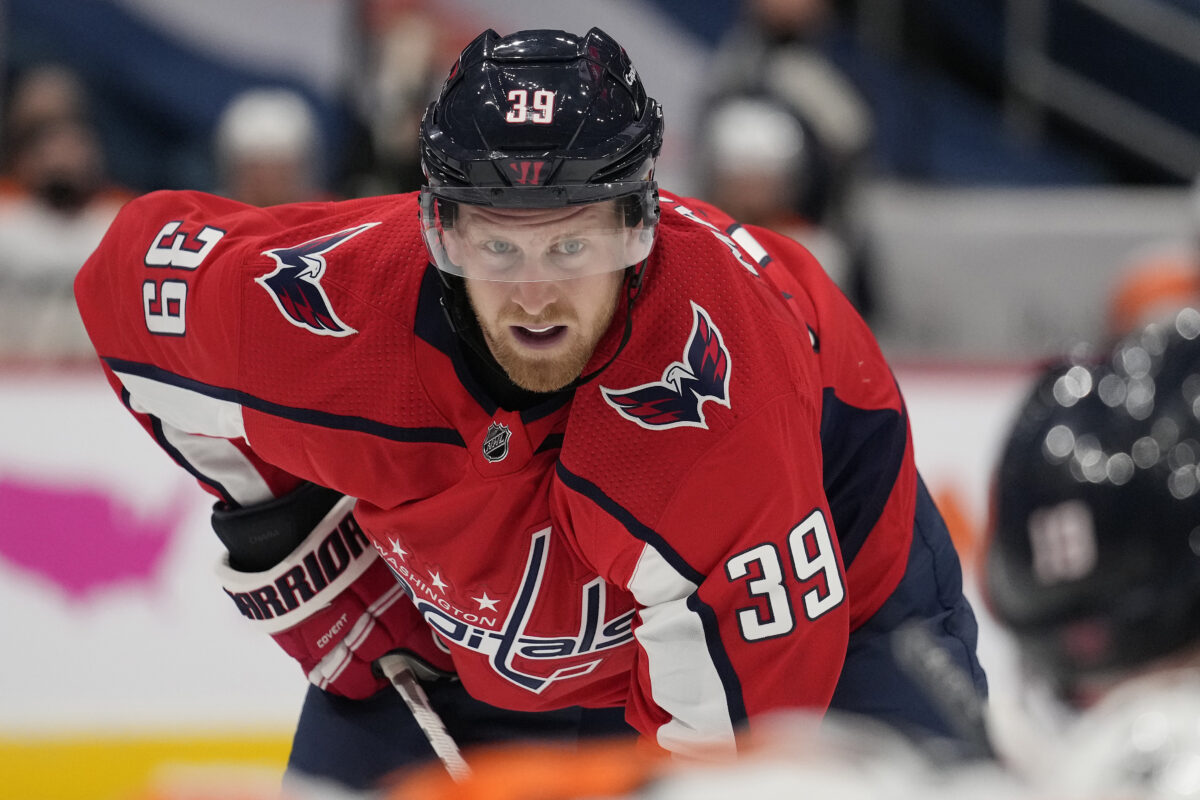
If anything the Capitals had so much depth, that it pushed younger, talented prospects out of the lineup entirely. Considering the flat salary cap situation, it’s actually impressive how well constructed the team was. They got big contributions from players like Sheary, Nic Dowd and Garnet Hathaway. Those three players combined make under $3 million. From a management perspective, this team was as ready as anybody could have made them. I’m honestly not sure what they could have done better from a roster-building perspective. Trading away Jakub Vrana in the deal to acquire Mantha may prove someday to be folly, but that’s up to the future to decide. For now, for the most part, management gets a free pass on this season’s disappointing finish.
Players Shoulder Some of the Blame
The players have to shoulder a sizeable percentage of the blame here, but a majority of it goes to specific players. The Capitals’ core of top players was simply not good enough against the Bruins.
| Bruins Top Players | Goals | Assists | Capitals Top Players | Goals | Assists |
| Patrice Bergeron | 3 | 1 | Nicklas Backstrom | 0 | 1 |
| Brad Marchand | 3 | 0 | Alexander Ovechkin | 2 | 2 |
| David Pastrnak | 2 | 4 | T.J. Oshie | 1 | 3 |
| Charlie McAvoy | 0 | 5 | John Carlson | 0 | 2 |
| David Krejci | 0 | 2 | Evgeny Kuznetsov | 0 | 0 |
| Bruins Total | 6 | 12 | Capitals Total | 3 | 8 |
The numbers don’t lie. Bruins key players contributed 18 points over the course of the series while the Capitals key players contributed 11. Those numbers are jaded slightly by Kuznetsov missing the first two games due to a second bout with COVID-19, though It’s still zero points in three games for him in the playoffs. Bruins goaltender Tuukka Rask certainly was excellent in the series, but this Capitals team is built on its ability to score points. During the regular season their goals for total was 191, which was third in the NHL. That’s an average of 3.41 goals for per game. Across five playoff games, they scored 10 total goals, averaging to 2.00 goals for per game. You cannot win a playoff series like that. Where did the goal scoring vanish to?
It has since been reported that Ovechkin will not play for Russia at the World Championship due to injury. Of those 11 points the Capitals core did have, four were obtained by Oshie, and four were by an injured Ovi. So, from a point-generation perspective, the two of them get to shrug off some blame. Backstrom, Carlson and Kuznetsov combining for three points over five games and being out-produced by an injured Ovechkin is not a recipe for success. Were they also injured? Exit interviews are happening today and everyone will find out about all the injuries that have been kept secret up until the end of the season.
Capitals player exit interviews today.
— Tom Gulitti (@TomGulittiNHL) May 25, 2021
John Carlson said he hurt his knee late in the regular season and is not sure yet if he’ll need surgery.
T.J. Oshie said his injury was to his midsection area and no surgery needed. Plans to start training again in a few weeks.
The numbers alone look bad, but they don’t tell the full story. The after-the-fact injury reports seem like a mitigating factor, but there were also some moments where the effort from certain players should have been questioned. There was a specific play at the end of Game 5 that sticks out as an example. With about a minute to go and the goalie pulled for the extra attacker, the Bruins dumped the puck into the Capitals’ zone. It looked like it was going to be icing. Backstrom skated back to touch up for the icing, but he did so with what appeared to be a lack of urgency. That allowed Bruins forward Curtis Lazar to come streaking by Backstrom, and beat out the icing call. Not only did this take away an offensive zone faceoff, but it also ate up precious seconds while the Capitals tried to get the puck back. It was such a simple play, but throughout this series simple plays have been turned into horrible mistakes by players who should know better.
It is as if there were momentary lapses of focus and these players forgot it was the playoffs. The sense of urgency has to ramp up — you cannot just burn the tape and move on to the next game. Is it because they’re playing hurt, or is it something else? There was a minute left and the team was down by two goals in an elimination game. The entire season, and everything that has been worked for up to this point hangs in the balance. There should be no moment of greater urgency, but instead everyone got to watch a future Hall-of-Fame candidate mail it in. The lack of effort on that play begs the question if Backstrom considered the game over already. At what point did he consider it over? At what point did he make the determination that less than 100% of his effort was acceptable? Was he physically incapable of giving 100% effort in that moment?
RELATED: Capitals’ Defensive Miscues Cost Them Again in Game 3
I’m focusing in on Backstrom here and calling him out by name, but he was far from the only Capitals veteran guilty of apparent lackluster effort at a key moment in the game during this series. It’s a really bad look for these players as individuals and causes uncomfortable questions to be asked. After three years of first-round exits, though, it’s time to start asking them. Are they content with one Cup? Is it enough for them to make the playoffs and then have an early exit? Are they just going through the motions at this point? Is age catching up to them, making it more difficult to be healthy and 100% in the playoffs when it counts?
Those questions carry accusations in their connotations. If I were to ask them these questions directly, I’m sure they would get angry, defensive, or possibly dismissive. I do not want to outright accuse the Capitals’ core of mailing it in these last three seasons, but the on-ice results cannot be ignored. There are those who will rush to their defense and claim that a writer who doesn’t play the game at their level couldn’t possibly understand. This season was a grind, there is no doubt about that.
The condensed schedule and the battle with COVID-19 that this team went through could certainly have been aggravating factors contributing to the end result. Nagging injuries would certainly have also contributed to making them less than 100%. If we’re going to give them that excuse this year, what excuse are we willing to give them next year? When do we stop coming up with excuses about why arguably the best wing-center-defender combo of their generation have only been past the second round one time in over a decade of playing together?
How Much Blame Belongs to Laviolette?
Is the coaching staff partially accountable when players show a lack of effort? In his post-game comments, Laviolette said something unrelated to accountability, but it might be worth reading into a little bit.
Capitals Coach Peter Laviolette on Alex Ovechkin: “Well I’d like to think he’s going to be back. This is his team.”
— Samantha Pell (@SamanthaJPell) May 24, 2021
Laviolette is the reason I say management “mostly” gets a free pass on the blame for this season. The curse of hindsight allows me to look back at the hiring of this coach and wonder if it was the right move for the team. On the surface, he seems like a great fit for the job. He’s made it to the Stanley Cup Final with three different teams and has historically done well with veteran groups. His comment calling the Capitals “his (Ovechkin’s) team” is probably a nothing comment, but for some reason it has stuck with me. It has me analyzing Laviolette’s previous success with veteran groups.
Laviolette won a Stanley Cup with the Carolina Hurricanes in the 2005-06 season. During the playoff run, he had a strong veteran leadership group on that team led by captain Rod Brind’Amour. Also in that group were grizzled veterans Doug Weight and Mark Recchi. These players were acquired by the Hurricanes during the season. Laviolette’s tenure with the Hurricanes is odd because they won the Stanley Cup in his first full season with the team and then missed the playoffs the following two seasons. They still had Brind’Amour as captain, but the team was unable to recapture the magic of the 2005-06 season. Laviolette was let go midway through the 2008-09 season.
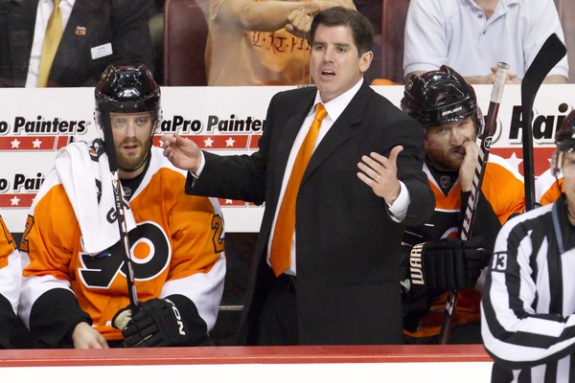
Stanley Cup-winning coaches do not tend to last long on the open market, and Laviolette was no exception. The Philadelphia Flyers parted ways with coach John Stevens early in the 2009-10 season. They hired Laviolette, and in his first year with the team, he led them to a Stanley Cup Final. This, too, was a veteran group led by future Hall-of-Famer Chris Pronger. This was the season that Daniel Briere produced 30 points in 23 playoff games with four game-winning goals. After losing the Stanley Cup Final to the Chicago Blackhawks, the Flyers experienced back-to-back second-round exits after 100-plus point regular seasons. In the lockout-shortened 2012-13 season, they missed the playoffs completely and Laviolette was fired the next season after losing the first three games.
How much of the Flyers reaching the Final was due to Laviolette’s influence and how much was the leadership of Pronger combined with a once-in-a-generation playoff performance by Briere?
His pattern of “success” with the Hurricanes and Flyers is likely what the Capitals were banking on. Laviolette came and took over teams that were veteran heavy and didn’t require a lot of “coaching” to reach the Final. He was able to implement systems and be a fiery personality when the time called for it. In the short term it would work because he had veteran players who effectively ran the bench and locker room for him. At first glance, the Capitals might seem like that kind of team. Looking at the history, they look like a team where Laviolette could be plugged in and give them that little tweak that gets them over the hump.
From an outside observer’s perspective, and looking back historically, it seems as if Laviolette counts heavily on his locker room leaders to hold teammates accountable. That system of accountability is not what got this Capitals team to their first Stanley Cup. The goal here is not to wax poetically over the style that Trotz used to coach/lead this team, but it is worth comparing and contrasting it with Laviolette. Trotz’ gravitas was such that he personally held each and every player accountable. I’m not sure Laviolette has that going for him.
Unfortunately for Laviolette, Ovechkin is not the same type of leader that Brind’Amour and Pronger were. That’s not to say that Ovechkin is a bad leader, or ineffectual leader, he’s just a different type of team leader. His leadership comes through in his effort, his toughness and his point production. He strives to be the best player on his team at all times — it’s a tall order to expect him to be that guy, and the guy who is holding all his teammates accountable. This is where I circle back around to wondering if Laviolette was the right person to hire.
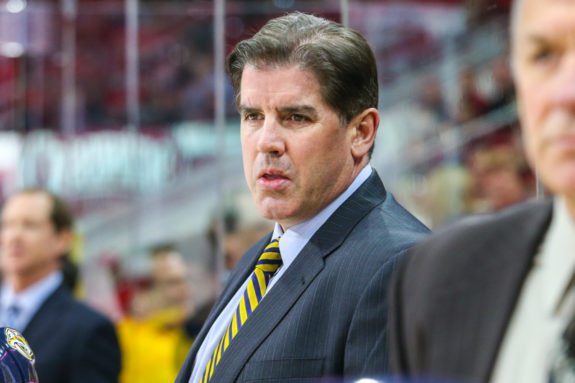
If he cannot get a room that contains Ovechkin, Oshie, Backstrom, Carlson, Chara, Carl Hagelin and Lars Eller to hold one another accountable, what the heck is he doing coaching this team? This was a veteran group by any definition of the word with multiple players held over from the 2017-18 team that won a Stanley Cup and a few others who have done it with other teams. Going forward, if this group of players cannot find the motivation “in the room,” then they’ve either got to have a coach who can motivate them, or they’ve got to change up who’s in the room. History tells me that Laviolette isn’t that external motivating factor and that his message goes sour very quickly with teams. He’s the epitome of a “short shelf-life” coach.
This article isn’t even touching on Laviolette’s actual systems, roster deployment, or apparent lack of trust in younger players. From just a standpoint of holding his players accountable and making adjustments, he shoulders a tremendous amount of blame for the season’s outcome. The defensive miscues, late-game mistakes and questionable effort on behalf of some players are questions that have dogged the Capitals all season long. Why, then, should anyone be surprised that they were their undoing in the playoffs? It is a coach’s job to correct these flaws or find some way to effectively work around them. In that regard, Laviolette failed miserably this season.
Special Teams Misery
It’s worth taking a look at the special teams statistics from this series. The Capitals’ power play was third in the NHL during the regular season with a 24.84% conversion rate. The Bruins shut it down.
| 2020-21 Playoffs Power Play | Bruins | Capitals |
| Game 1 | 1/4 | 0/1 |
| Game 2 | 0/2 | 1/4 |
| Game 3 | 1/5 | 1/5 |
| Game 4 | 3/5 | 1/7 |
| Game 5 | 0/3 | 0/4 |
| Total so far | 5/19 | 3/21 |
The Capitals scored one power-play goal on seven power-play chances in Game 4 and zero on four chances in Game 5. Overall, they were a dismal 14.28% in this series. For comparison’s sake, the New Jersey Devils’ power play during the regular season had a 14.19% conversion rate for the fourth-worst in the NHL. For a team that has the weapons that the Capitals have on the power play, that just simply is not good enough. For any team, that’s not good enough to win a playoff series.
Their penalty kill was equally as bad. The Capitals were 14/19 on penalty kills making their kill percentage 73.68%. During the regular season, that would’ve been good enough for third-worst in the NHL. Special teams performing this poorly is a recipe for disaster in the playoffs. The blame on this gets equally shared between the coach and the players. Coaching has to adapt to what they see the opposition doing and find ways to be successful. Players have to properly implement the system and dig down for the extra effort to be successful. One for 11 in the final two games of the series suggested that neither party did their part to fix it. This particular point of failure gets thrown on top of the pile of questions that have already been generated.
Where Do They Go From Here?
The question around keeping Ovechkin seems like it has an obvious answer. If they can get him to take a team-friendly pay cut, it makes them more flexible going forward. How much of a pay cut he’s willing to take is anyone’s guess. Capfriendly.com estimates that he has made an excess of $123 million over the course of his career. His annual salary cap hit on his expiring contract was $9.538 million per season. Expecting him to take too much of a pay cut might come off as disrespectful, but a team-friendly deal south of $7 million per year is in his and the Capitals’ best interests.
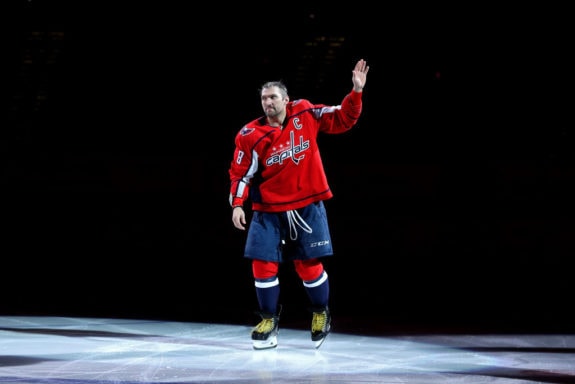
Beyond Ovechkin, there’s likely to be some other roster changes to be made. The expansion draft is going to certainly claim a useful player unless the Capitals make some kind of deal with Seattle on whom they take. I’ve always thought the fates would conspire to send Oshie to Seattle to be the team’s first captain. His ties to the Seattle area are well documented and it would be a nice story for him in the twilight years of his career. That said, the Capitals relied on Oshie quite heavily this season. He averaged the third most ice time among team forwards with 18:04 per game and was called into action as a center on several occasions. There’s also his point production, as he finished the season with 43 points in 53 games. Allowing him to go to Seattle would open up $5.75 million in precious salary cap space, but he would be a very difficult player to replace.
What They Could Do Going Forward
The potential is there for the Capitals to reinvigorate their franchise with prospects and youthful additions. If MacLellan decides to break up the core and shake things up, they could reap strong returns for a few parting pieces. Dmitry Orlov and Kuznetsov would seem like the obvious players to part with. Kuznetsov saw his effort called into question by his general manager earlier in the season. (from ‘Evgeny Kuznetsov, electric but inconsistent, might be the key for the Caps this season,’ Washington Post, 01/16/2021) Also, the team really did not seem to miss him all that much during both his bouts with COVID-19.
The Capitals have a young, dynamic prospect center in Connor McMichael and a serviceable center in Eller who could take Kuznetsov’s minutes. There are several teams, including the New York Rangers and Minnesota Wild, who could make very good use of Kuznetsov’s abilities if he were to rediscover his motivation to reach top form. Those two teams in particular have young Russian players whom Kuznetsov would likely be paired with. They could be a good places for him to get a fresh start.
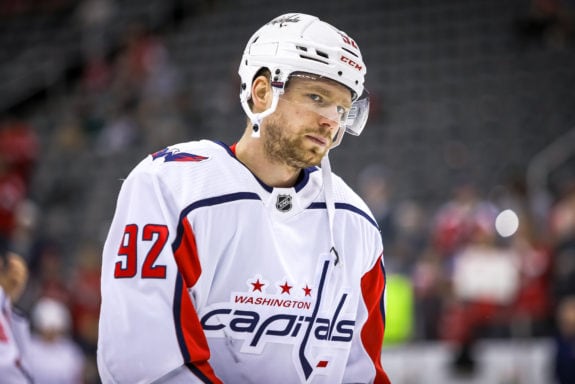
At times Orlov looked like a square peg in a round hole in Laviolette’s system. If the Capitals decide Laviolette is their coach of the near future, Orlov is unlikely to be as successful as the team needs him to be, and the return they could get for him could be sizeable. There are plenty of teams who would see him as an upgrade from their current defensive group who might be willing to part with future selections in return for the Russian defender. Parting with Kuznetsov and Orlov would also open up $12.9 million in salary cap space. If the Capitals took no big contracts in return, this would allow them the cap space to wheel and deal to obtain potential cap casualties from other teams, while also outfitting themselves for the future. Some shrewd moves by MacLellan could see the Capitals avoid a painful rebuilding process and just transition to the next generation of players.
RELATED: Capitals Need to Start Thinking of the Next Era
Unfortunately, their current head coach is not one with a tremendous track record of working with young players. He showed this tendency in spades this season. Daniel Sprong only averaged 11:40 of ice time through the 42 games he was used, but scored 13 goals to tie for fifth on the team. Prospect defenders Martin Fehervary and Alexander Alexeyev did not receive NHL call-ups to rest older Capitals defenders, while 23-year-old defender Jonas Siegenthaler was jettisoned to the Devils. When the team was decimated due to injuries, Laviolette opted to press Oshie into service as a center, rather than use McMichael. The one game McMichael did get, he was only given 9:54 of ice time. As long as Laviolette is at the helm, going younger does not seem to be a tact the Capitals will take.
What They Are Likely To Do Going Forward
It seems likely that management will double down on their decision to hire Laviolette and work to acquire players that fit his scheme better than some of the players they currently have. I would expect them to try to make some salary cap space somehow, and that could likely still include trading Kuznetsov. If a deal isn’t made with the Seattle Kraken regarding Oshie, I expect some other deal to be made where the Capitals trade the Kraken a package to ensure they pick someone the Capitals are willing to lose. It no back-door deals are made regarding the expansion draft, it seems likely that the Capitals could lose a defender. Orlov and Carlson are the obvious first two to protect with the third protection slot coming down to a choice between Schultz and Dillon. Whomever they don’t protect among those two, is probably gone.
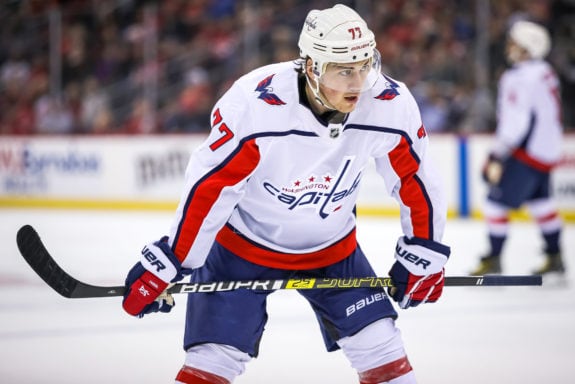
In free agency, it wouldn’t shock me to see them go after a veteran defender or two. After how this season played out, they are most certainly making some kind of shuffle in their top four on defense. It could mean losing Schultz or Dillon to the Kraken, of it could be the result of Schultz, Dillon or Orlov getting traded. Regardless of how it happens, it seems a given that they will not try to enter next season with the same defensive unit they finished this season with.
There are some good names available on defense that could fit what the Capitals want to do. After getting an up close look at Mike Reilly for five games, it wouldn’t be a shock if they tried to add him. Alec Martinez and Ian Cole are names they might look into also on the left side of the defense to try to bring in an additional veteran voice that has reached the mountaintop before. If they move on from Schultz and want to add an offensive presence on the right side, Tyson Barrie could be in their sights. They’d very likely have to clear a sizeable chunk of cap space to make that deal happen, though.
Up front they will try to find some goal-scoring help. There’s a few really good shooting wingers set to be available in free agency. Of those likely to be available, Kyle Palmieri and Mike Hoffman seem like the best fits that the Capitals could afford to sign if they create a little salary cap space in advance. If management goes big with regards to opening up salary cap space, then a potentially more expensive name like Taylor Hall or Gabriel Landeskog could be possible.
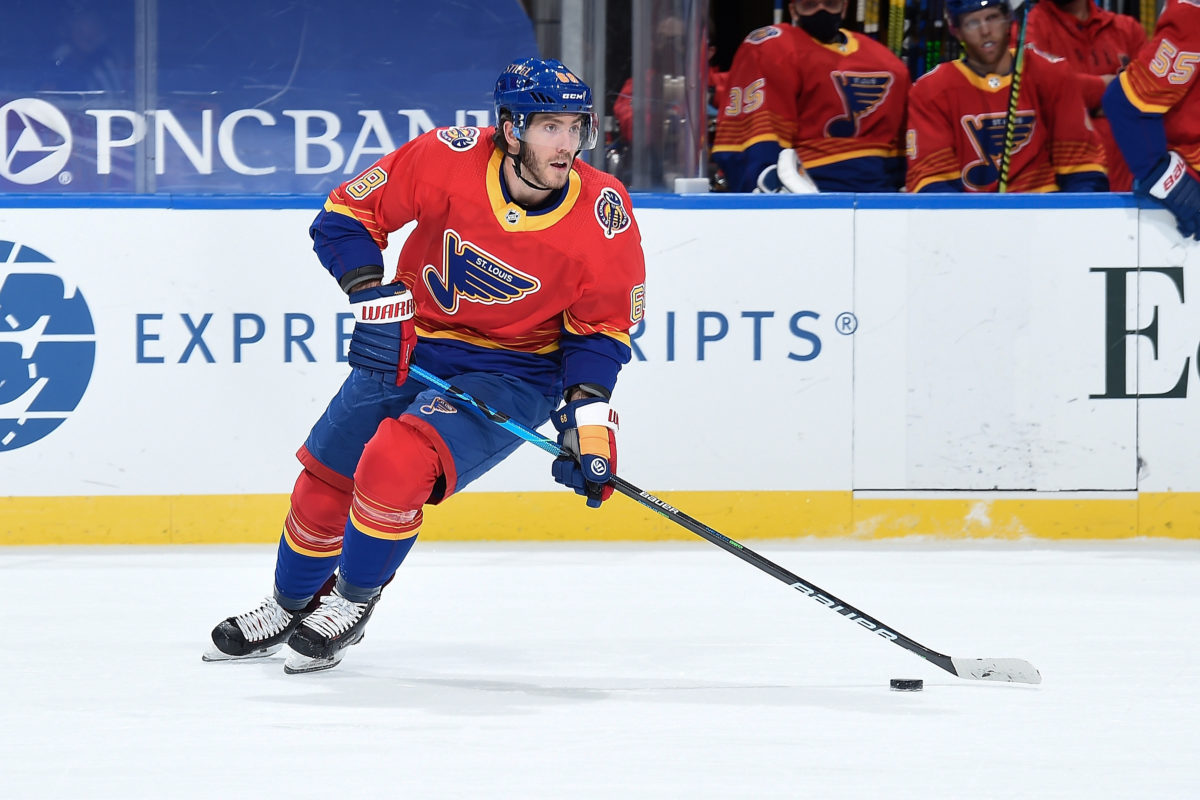
I expect some roster turn over, for sure, but I don’t expect a sudden change in tact. MacLellan is going to make moves geared towards propping open the team’s current Stanley Cup window. If he has to part with some of his top prospects to make those deals happen, he’s not going to hesitate to. As much as some hockey minds would like to see this team be proactive about the future, it’s not likely to happen so long as Ovechkin is a key piece of the roster. Until he calls it quits, this will be his team, no matter who manages it, coaches it or plays for it.